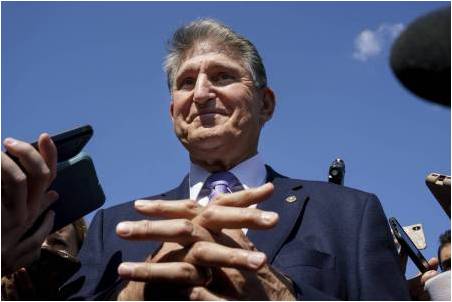Case study and dissection of a fossil-fuel puppet politician holding a government to ransom

America’s Joe Manchin illustrates shows how damaging a puppet can be when a balance of power can be exploited
Although America’s Congressional electoral system differs substantially from Australia’s, the role super-wealthy special interests play in controlling both governments is similar. Geoff Goodell’s article in Mother Jones explores the impact a single special-interest puppet politician can have where he/she can exploit a balance of power. It is even worse when a whole government in power is riddled with with such puppets as is the case in Australia now.
Manchin’s Coal Corruption Is So Much Worse Than You Knew
The senator from West Virginia is bought and paid for by Big Coal. With his help the dying industry is pulling one final heist — and the entire planet may pay the price.
By Jeff Goodell
January 10, 2022
RollingStone
…
At this point in human evolution, burning coal for power is one of the stupidest things humans do. Coal plants are engines of destruction, not progress. Thanks to the rapid evolution of clean energy, there are many better, cheaper, cleaner ways to power our lives. The only reason anyone still burns coal today is because of the enormous political power and inertia that the industry has acquired since the 19th century. In America, that power and inertia is embodied in the cruel and cartoonish character of West Virginia Sen. Joe Manchin, who, paradoxically, may have more control over the trajectory of the climate crisis than any other person on the planet right now. Kidus Girma, a 26-year-old Sunrise Movement activist who helped organize protests against Manchin this past fall, calls him “the final villain.”Manchin’s influence comes from the fact that in an evenly divided Senate, he is the swing vote that can make or break legislation. He presents himself as a pragmatic man from a hardscrabble state who is always trying to do the right thing. He values good manners and civility, and sometimes seems to be channeling the folksy charm of another famous West Virginian, test pilot Chuck Yeager, who was immortalized in The Right Stuff.
The truth is, Manchin is best understood as a grifter from the ancestral home of King Coal. He is a man with coal dust in his veins who has used his political skills to enrich himself, not the people of his state. He drives an Italian-made Maserati, lives on a houseboat on the Potomac River when he is in D.C., pals around with corporate CEOs, and has a net worth of as much as $12 million. More to the point, his wealth has been accumulated through controversial coal-related businesses in his home state, including using his political muscle to keep open the dirtiest coal plant in West Virginia, which paid him nearly $5 million over the past decade in fees for coal handling, as well as costing West Virginia electricity consumers tens of millions of dollars in higher electricity rates (more about the details of this in a moment). Virginia Canter, who was ethics counsel to Presidents Obama and Clinton, unabashedly calls Manchin’s business operations “a grift.” To Canter, Manchin’s corruption is even more offensive than Donald Trump’s. “With Trump, the corruption was discretionary — you could choose to pay thousands of dollars to host an event at Mar-a-Lago or not,” Canter tells me. In contrast, Manchin is effectively taking money right out of the pockets of West Virginians when they pay their electric bills. They have no say in it. “It’s one of the most egregious conflicts of interest I’ve ever seen.”
As a citizen of both countries (born in the USA, naturalized in Australia), I am distressed to se how completely both governments have been corrupted by obscenely wealthy special interests at the expense of the vast majority of their citizens. In the best of circumstances this would be bad. But now, our whole species realistically faces potential extinction from a climate emergency triggered by the fossil fuel industry’s many decades of greenhouse gas emissions. Rather than acting to protect their citizens from the emergency, to protect their masters, these puppet governments are impeding and even stopping effective action against the emergency.
The special interests use many tools beyond influencing/controlling our governments to deny, hide, misrepresent, and distract to keep people from from recognizing just how urgent the need for action on climate change is.
Australia is still nominally a democratic nation. In the upcoming Federal Election, we have the option to remove the LNP COALition puppets and their ‘independent’ fellow travelers from power. In their place we can elect candidates who can be trusted to act to solve the climate emergency as their first order of business in Parliament.
We are not telling anyone who they should vote for…. Vote Climate One’s Traffic Light Voting Guide is designed to help you rank all the candidates on your electorate’s ballot to maximize the chance that if your first preference is not elected, at least someone else who supports climate action will be elected and to exclude exclude the possibility that your vote will flow to a special interest puppet if your first ranked candidate is not elected.